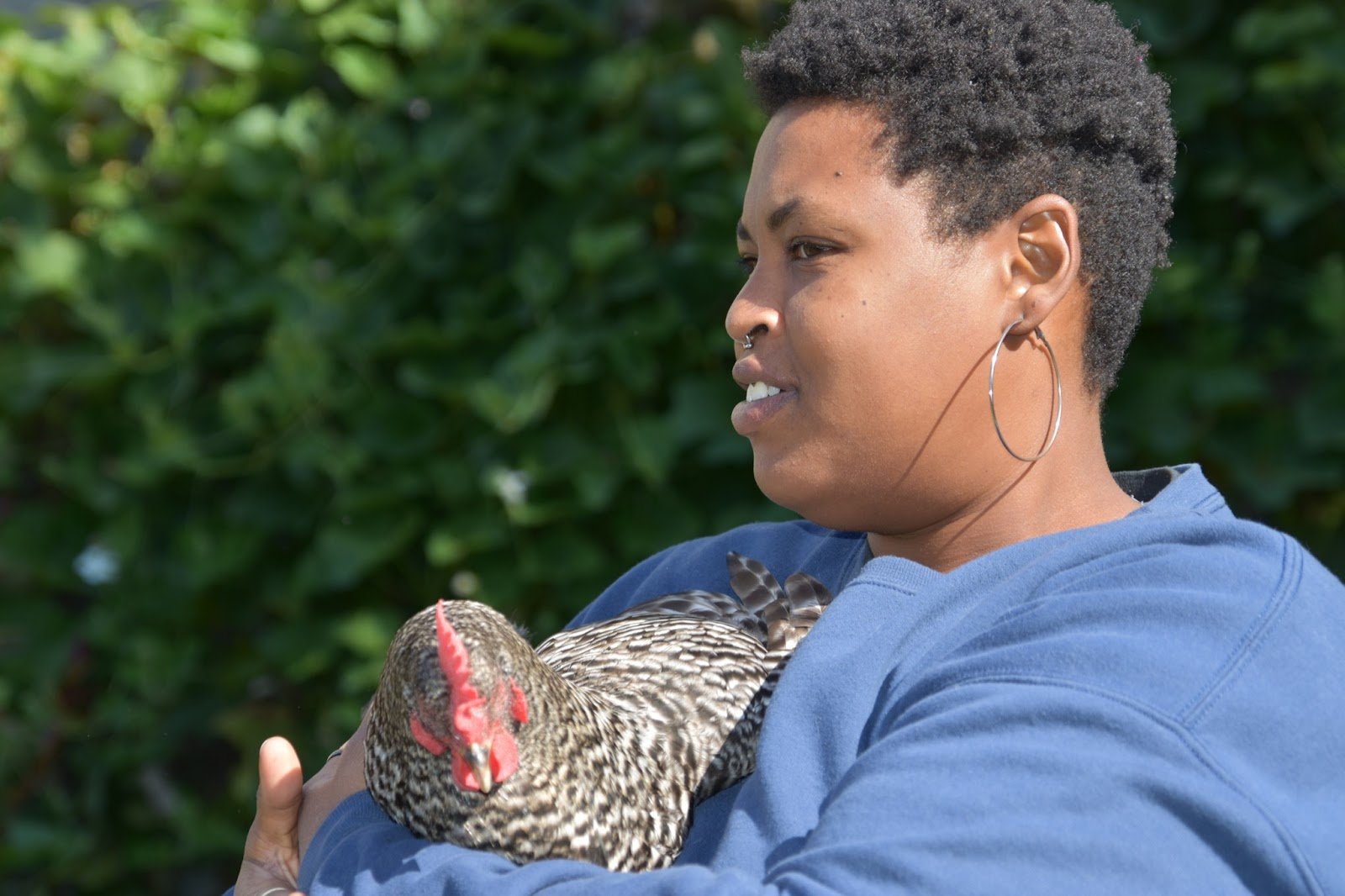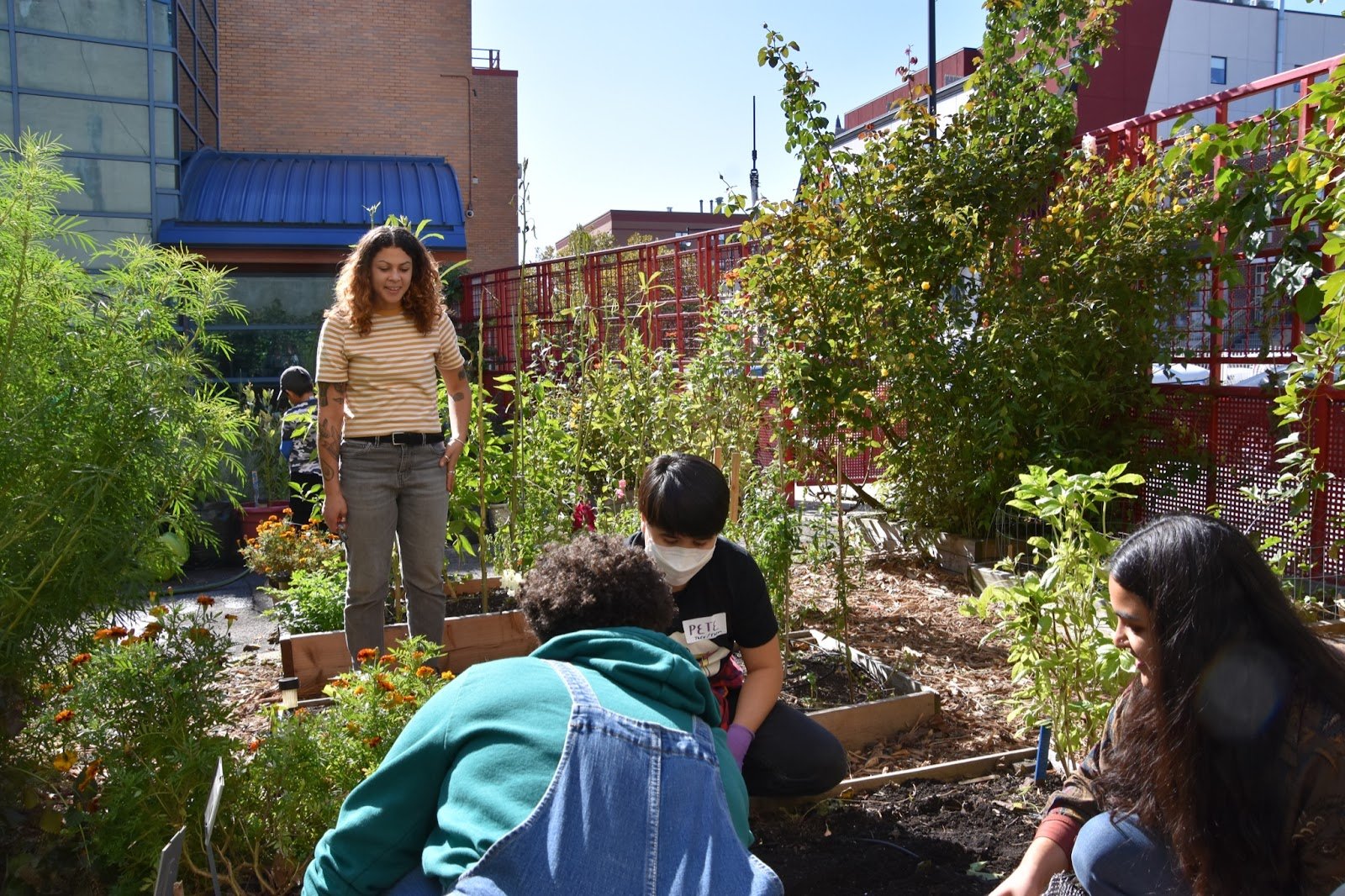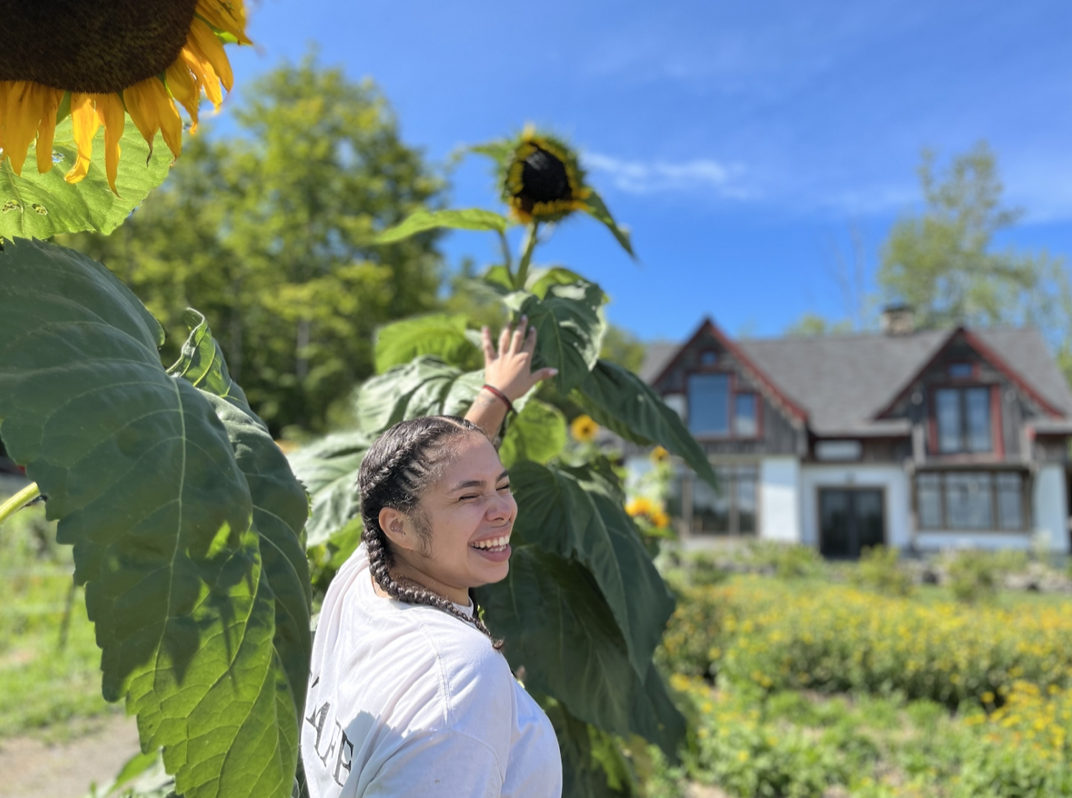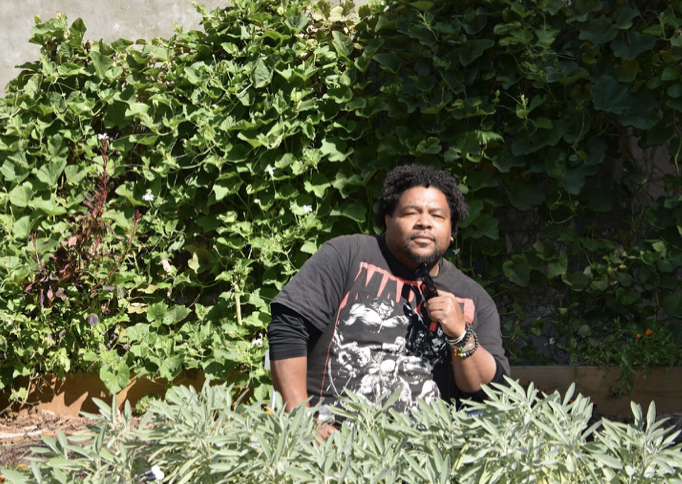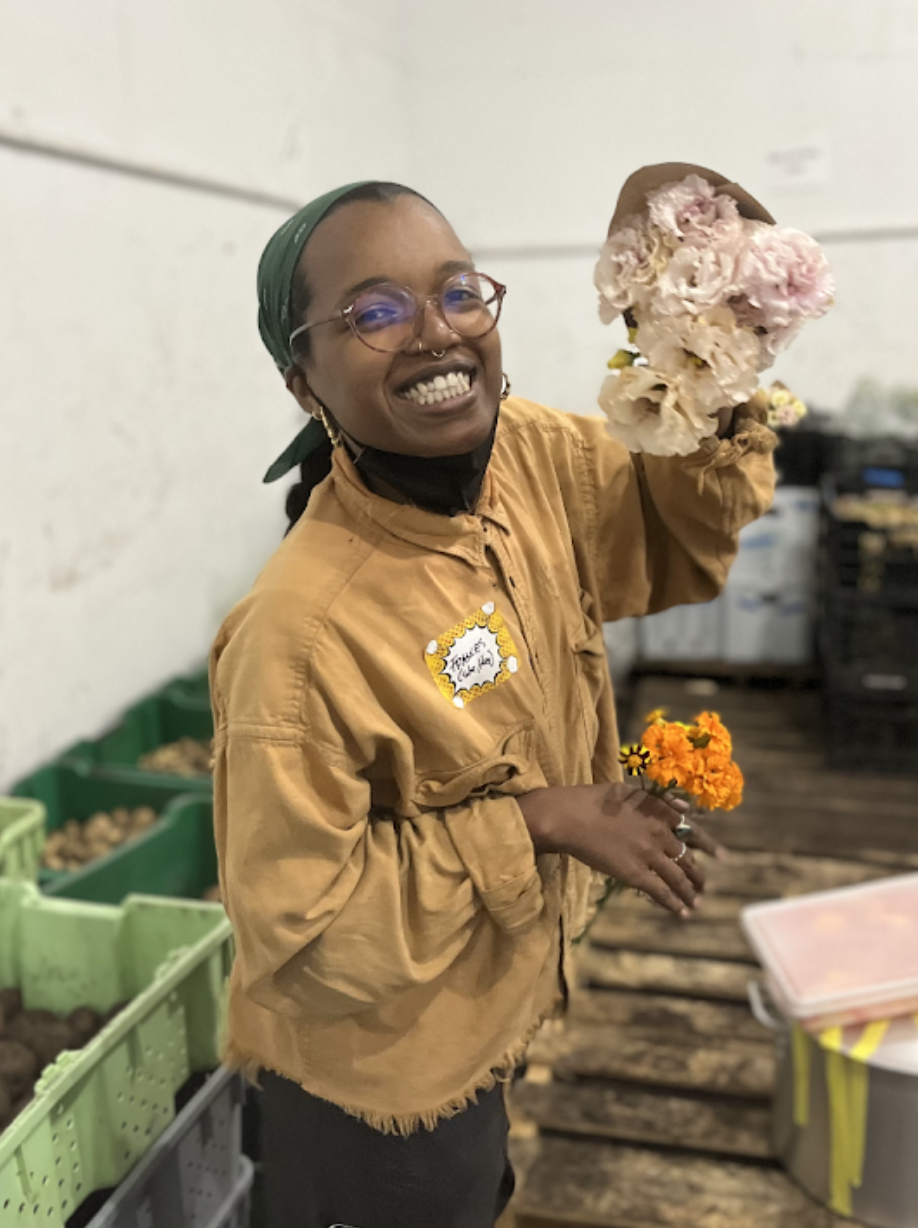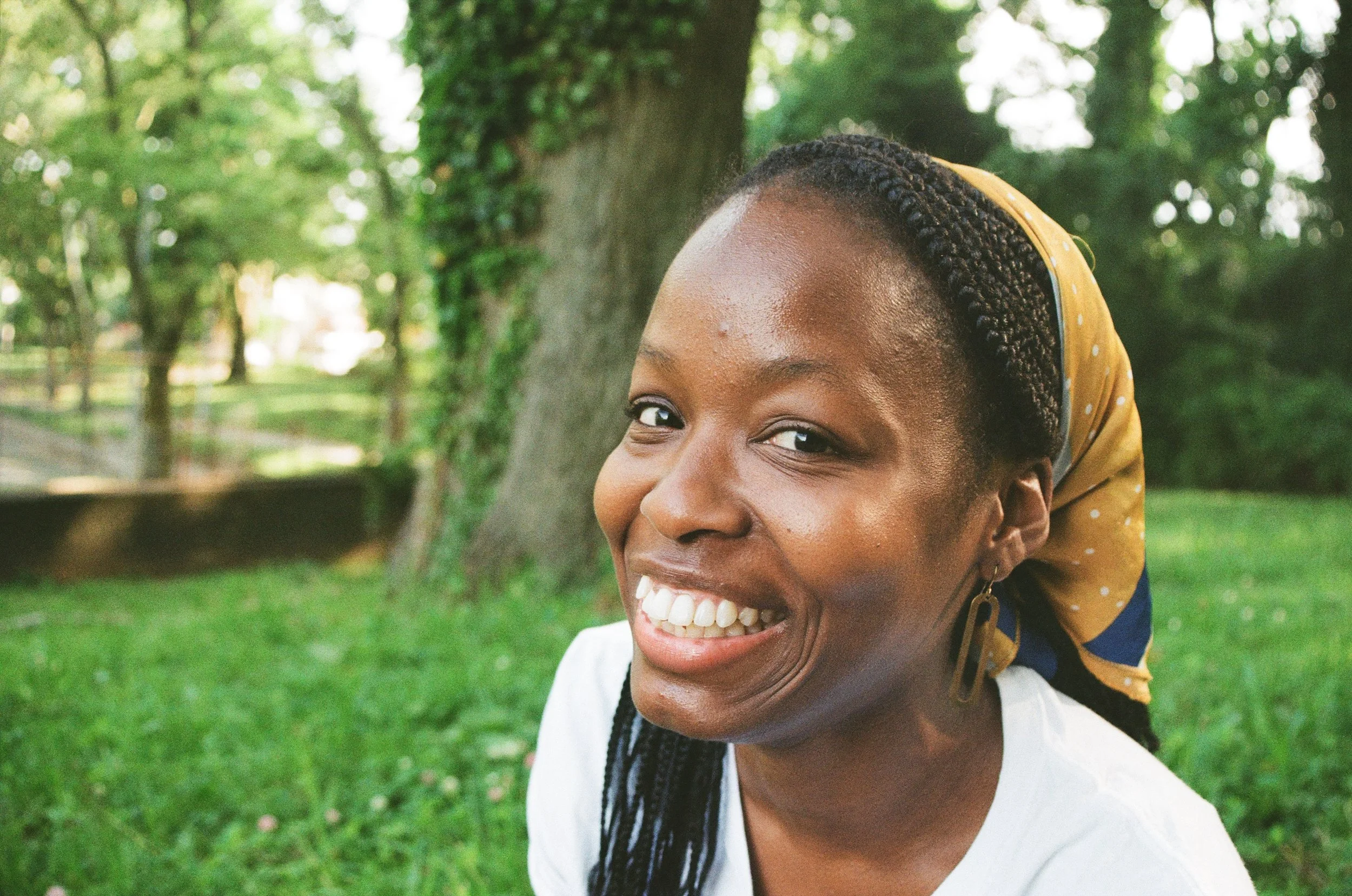FSNYC Stories
Each year we collect stories from our community. The best way to showcase the talet passion and resillience of QTBIOP Farmers is to uplift their stories. Here you’ll find our stories archive where you can catch a glimpse into how FSNYC has impacted each of these lives, and how each of these people impact their communities.
Kitty & Sea
Facilitators
Kitty and Sea are committed to saving the environment one seed or student at a time. They are co-facilitators at FSNYC who both entered this work from ancestral traditions. They now teach several classes together as they figure out pathways to long-term land access for their project, Iridescent Earth Collective. Read both of their stories and how they joined forces to start this incredible venture here!
Weirdos Welcome!
“If you come from marginalized communities and want to hang out with weirdos, nerds, this is the community for you.”
Kitty is a farmer and farm educator. A large portion of their upbringing took place on the Taqwa Community Farm, which was started by Kitty's family, lead by their grandfather Abu Talib, a founder of FSNYC. Kitty grew up at Taqwa as the values and ideas that shaped FSNYC were emerging (and participated in early training programs). One of the main Farm School values that stuck for Kitty was the Training of Trainers model. Training of Trainers was a remarkable development in the early 2000s, which empowered Kitty as a young educator. This model supplies FSNYC students with the educational tools they need to engage others, share knowledge, and eventually step into leadership positions.
It was in part due to the Training of Trainers model that Kitty felt confident to teach FSNYC with Ursula Chanse at Bronx Green-Up and later with Sea. This pathway to facilitation often happens at FSNYC where the elders can trust their students to carry on the legacy and bring new aspects to the work. As Kitty and Sea’s teaching progressed, the chemistry and curriculum they built was based largely on contributions from various community members.
Kitty continues to shape the community in FSNYC and beyond. The loving and welcoming energy they bring to spaces helps us to continue to foster a community built on inclusivity and connection.
Following in the footsteps of Family
“This was the type of work I wanted to do. I found my answers in the soil and the trees because plants heal and the earth heals us.”
Sea grows for the village that raised them and for the future. Sea Identifies as a NYrican Queer Latinx educator and farmer from the Bronx. Growing food and land connections started as an ancestral practice for Sea. They now grow to celebrate themself and to become a good ancestor. This work serves their community and builds towards the future they have been fighting for.
Sea started growing food to connect with and honor their grandmother. After losing their grandmother, Sea felt lost and disconnected from their culture, family, and community. Sea remembers their grandmother had so many plants in the house and they admired how she always opened her door, heart, and kitchen to the community. Sea wanted to tap into this plant and communal connection and so they googled, "how can I become more connected with plants?" FSNYC was the first thing that came up.
Sea saw that FSNYC had many compelling components, including racial justice and land sovereignty work. At that time, applications to our city wide course were closed, but a public irrigation offering was open. Sea immediately felt safe walking into our irrigation course at la Finca del Sur and recognized it was one of the first times they felt entirely safe walking into a random place in NYC. Seeing how many QTBIPOCs were present and how excited they were to learn about food education was refreshing. When applications finally opened, Sea applied and was accepted into our citywide course. Less than a year after graduating from FSNYC, Sea was able to join our team as a co-facilitator.
A Visionary Union
Kitty and Sea came together to teach (after briefly working together at Bronx Green Up in spring of 2020. As the pandemic grew they began to collaborate on mutual aid farming with morning Glory Communtiy Garden and Taqwa Community Farm, and worked together to support the South BX food hub. Bronx Green-Up later created the Bx Farm Hub project, coordinating various community gardens in collectively producing and distributing food. In spring of 2021, Kitty and Sea along with 3 others created the Black Yard Farm Collective.) Though the venture could not be completed as envisioned, it was still an important learning experience that led Jess Kitty and Sea to seed a new vision: Iridescent Earth Collective!
Iridescent Earth Collective is a Queer, Black & Latinx-led farm group, that grows food upstate for mutual aid food distribution in the Bronx. Kitty and Sea are in the process of figuring out a pathway to long term land for Iridescent Earth Collective.This process involves acquiring land in an agriculture land trust signed off to BIPOC farmers. This will ensure the land can stay fertile and continue growing food instead of being sold to government contractors with no interest in cultivation. They hope that other BIPOC farmers can replicate this model to have land access.
Iridescent Earth Collective is part of Kitty and Sea’s long-term vision to create stronger urban-rural pathways for FSNYC students to access land and grow food for their communities. They both know increased community capacity and intentional resource sharing have helped their work as well as the food and land justice movement expand, and they advocate strongly for this mutual aid work to continue.
Cynthia
23’ Alumni
Home Chef Cynthia is a current Farm School student, who values connections and dream curation. After graduating from undergrad, Cynthia was craving community. Cynthia got her degree in geography and has always been interested in the geography of food. Cynthia saw FSNYC as a community center for food and land justice that would allow her to explore food pathways.
Cynthia's favorite FSNYC memory was a student-led trip to Soul Fire Farm where she was able to learn about the ways that they lived on the land. Shaping the land to be in harmony with the Earth and respecting the land's resilience were key takeaways from the experience. The idea that home could be a place for this meaningful work was also inspiring to Cynthia.
Sage
‘23 Alumni
Cynthia hopes to start a food truck business that allows home chefs to share their food. Her business, Cyns Joint, is starting in the south BX and she eventually hopes to expand nationally and globally. Cynthia makes sure the food she serves is locally grown, seasonally appropriate and culturally diverse.
Her advice for potential FSNYC community members is don’t get discouraged if you don't get accepted. She says, “This was my 3rd time applying and I got clearer on my mission every time.”
“Food has no boundaries. Gardens are sustainably diverse and that’s what I want my food to be about. ”
Sage is a Black male educator in the Moshulu area of the Bronx. He is a self proclaimed life long learner who enjoys enriching himself in educational opportunities that allow him to grow. Sage currently works for the Department of Education as a special education teacher and as an educational specialist with the Mosholu Montefiore Community Center.
Sage started growing, because his mom always had a green thumb and he wanted to be able to tap into it. Sage initially grew food in school by creating two garden plots and makeshift raised beds from school desks and using tupperware bins as transportable planters. His annex garden grew cherry tomatoes and continued to reuse the items the school threw away.
His advice to future FSNYC students is to be patient. He says, “Flowers don’t grow overnight.”
When Sage got into FSNYC, his gardening career took off. Since entering FSNYC, Sage has learned to look at his audience differently and incorporate food and land sovereignty as well as popular education practices into his teachings. Sage’s favorite class from FSNYC was carpentry with Kitty and Sea because he got to build and is excited to be able to make more things in the future. That class allowed him to understand how he can build, not just repurpose materials for the garden.
Farm School has not only shifted how Sage grows, but also how he teaches. Farm School NYC helped Sage understand his place in the community. He now sees that everyone has a different role in the food justice movement, and his role is to keep the movement moving towards the future by teaching the children today what he learns in Farm School.
After seeing the growth of Sage’s annex garden, Friends of Mosholu Park did some outreach and got others involved in the community. The horticultural society donated 8 raised beds and began to teach lessons in the garden at the School. The garden now serves special needs students, after school programs, parents and the larger community.
Because of his thriving garden, Sage was moved into the role of stem teaching. As a STEM teacher he hopes to build everything with his students, drawing inspiration from Camille's sink at Bushwick Grows Community.
“Farm School helped me understand how to impact the future. My main goal is to teach children to teach themselves ”
Hyunhee
‘23 Alumni
Hyunhee (they/she) advises future students to have patience and progress through the courses at their own pace. They want students to know it's important to allow the coursework enough time to sink in, and to keep in mind that this is just the start of a lifelong journey in land stewardship.
Have you ever walked into a space and felt at peace? What truly distinguishes a space is when the stewards approach their relationships with the land and with people from a place of integrity, care, and joy. Hyunhee spoke about feeling this alignment and full-bodied joy during a Farm School lesson at Good Life Garden.
Hyunhee started researching foraging and wild plants in 2021. The same year they began studying community herbalism out of a deep desire to tap into their ancestral lineage of farming and herbal medicine. Hyunhee comes from a family of peasant farmers in Korea. Their maternal great-grandfather was an acupuncturist and herbalist in the village. Their family's farming and herbal medicine practice skipped their parents' generation, so Hyunhee is slowly learning their way back to a relationship with plants and the land.
Hyunhee joined FSNYC after they started reclaiming their ancestral connection with the land. The decision to join FSNYC came at the ideal time as they dream of starting a queer Korean homestead. Hyunhee hopes to build a homestead in a relationship with the land, people, and stories that have existed and will exist there. They plan to grow Korean vegetables and herbs, connect with Korean land-based spirituality, and offer healing practices, such as meditation, horseback archery, and rage practice workshops. Hyunhee is committed to creating a space with integrity and deepening their relationship with the land in the community. To them, it is a dream to be able to set aside time to learn about urban farming and food justice with FSNYC.
Hyunhee recognizes how important food sovereignty praxis is and how it truly distinguishes FSNYC from other urban farming initiatives. For example, they loved the anti-oppressive framework offered during our irrigation course, which grounded students in water politics. Students learned about the construction of irrigation systems as well as the underlying political issues regarding access to clean water. Farm School holds space for this complexity and cultivates shared learning about resistance to our oppressive food systems through the communities we are working to serve.
Frances
‘17 Alumni and Program Manager
Frances is excited to continue to be of service to students as our program co-coordinator. The communication, care, and tenderness they contribute to FSNYC cultivates a welcoming vibe that allows people an entrance to this tender work.
Frances (they/she) is a black woman land steward, community organizer, and a program co-coordinator with FSNYC.
Frances was a budding community organizer, awakening to land sovereignty, abolition, and anti-policing work when she found out about FSNYC. They were amazed to see a program in the city that focused on food and land justice with a social justice framework. Frances remembered feeling they needed more experience before entering FSNYC, so they joined La Finca del Sur urban farmer cooperative to learn how to grow food and medicine.
As a student at FSNYC, Frances held a coordination and facilitation role at the Summer Youth Employment Program. Frances was able to utilize the FSNYC Training of Trainers model in this role, as she was working to support, nurture and teach students what she was learning in Farm School. After graduating from Farm School in 2018, Frances joined Woke Foods, started by FSNYC Alumni Ysanet and Marilease, and supported emergency food distribution during the pandemic.
Frances continued applying her learnings from Farm School NYC when she began to co-facilitate Irrigation and Learning the Land with Lorrie Clevenger, a FSNYC founder. In 2021, Frances shifted to the position they now hold as program co-facilitator at FSNYC. Frances now manages La Finca Del Sur and continues to support Woke Food distribution in the South Bronx, while coordinating student journeys at FSNYC.
Frances embodies being of service to the community. She supports people in returning to the land and encourages people to believe in the process of stewarding the land and reconnecting to deeper ancestral knowledge. Frances facilitates people with care and validation, empowering them to demand to feel seen and heard. Their soft and radical approach to this work encourages people to bring their best selves while still prioritizing themselves and rest.
Bilen
Founder
Bilen, a founder of Farm School NYC, remembers the seed of the idea for Farm School was planted at the grail. Members of the civil sector, non-profit sector, and community all came together for an informal weekend retreat to dream, collaborate, and plan a unique urban agricultural training program.
In the beginning, FSNYC was working as an ecosystem to bring various offerings from people working in each sector. Bilen, who worked in the parks department, helped to plug up holes that may not have been covered in Farm School NYC’s initial funding by redirecting resources and finances to the school. With Bilen’s support, FSNYC was able to alleviate some of the pressure the organization faced from grant cycles and other things that challenged its sustainability.
Bilen and the other founders envisioned Farm School NYC as a program to bring up new generations of urban land stewards with their education rooted in the spaces the community supported. It was an intentional call to work with gardeners, farmers, and educators from the community who had been doing this work from the ground up. Oftentimes, the knowledge of community members and elders is not seen as valid "formal training.” But in this intergenerational, community-led educational space, Farm School aimed to shift these perceptions and create a school where the voices and experiences of elders and community members were valued.
Bilen along with the other founders worked diligently and intentionally to ensure that curation of FSNYC was generative. The variety of backgrounds and experiences each person brought was called upon. Together, they collaborated to envision a project that would serve NYC long into the future. Their skill and cooperation created the system of change we know today as Farm School NYC.
"This shows what is possible when people are clear on what they are doing, why they are doing it, and who they are doing it for" - Bilen
According to Bilen, FSNYC is a testament to this teamwork. It was a space where everyone was showing up for one another to support the final project. Bilen treasured being able to witness and participate in people power in action. She walked away from the process understanding what collaboration looks like across sectors and how when a group of people come together to invest their energy into co-creating a shared dream, a dream comes true.
Bilen, who still stays in contact with current students, feels like she is now seeing the forest from the initial seeds she helped plant 12 years ago.
AL
‘23 Alumni
Al (he/him) describes Farm School as a year-long sampling platter where each course provides students a taste for exposure; if students want to get deep into the “meat and bones,” they'll have to do additional educational work and exploration themselves.
“Being in community with like minded, equally driven people inspires me to pay it forward to others. All the lessons and experiences shared with me via FSNYC makes me want to strengthen that network and tie it to the other networks, so that I may create stronger and more meaningful bonds between those growing food and those cooking food and feeding people.”
Al, a professional chef for nearly 13 years, was initially interested in Farm School to gain the skill of growing food. After working in the capitalist restaurant industry, Al transitioned to institutional cooking and cooking for schools to help him explore education. Al always believed “Food should be for everybody,” and continued to search for an alternative that aligned with this value around accessibility. Al appreciated that FSNYC was accessible, truly for the people, and he saw the organization as a space to expand his vision. As a student, Al was happy to build an even deeper relationship with food through our programming.
The most impactful part of the journey for Al was the farm school network ; the people he has been able to meet and the relationships he has been able to build have impacted his life beyond Farm School too. Al currently calls Red Hook Farm his farm home, and is happy to have a place to practice and observe all of the farm school teachings while building community with the amazing Red Hook Farm folks.
In the future, Al hopes to build on the popular education model he learned at Farm School as he works towards his vision of training more chefs with a focus on food and social justice.
Maya
Facilitator
Maya is a gender-vivid water being and land steward who loves to feed people and nurture their relationships to food. This beloved Farm School NYC faculty member has seen the school grow since our beginning.
Maya’s favorite Farm School Memory was the first in-person propagation class after the start of the pandemic. The relief of being back on land and getting to connect with students again was deeply refreshing. Seeing everyone’s personalities and having the ability to be in the community again while co-facilitating with Amara is something that sticks out for her about Farm School and that unprecedented time. For Maya, teaching during the pandemic was a moment of intense growth, and she learned how to become more flexible through collaborating with Farm School and other organizations who were providing a gentle push and encouragement to meet the needs of students.
Maya
According to Maya our largelly dual facilitation model benefits learners and facilitators by keeping the learning process flexible and creating more pathways to implement feedback, giving facilitators a balance of autonomy and support. "Facilitators understand that each cohort brings new needs, new challenges and growth areas, and we’re expected to understand and adapt to these changes as we welcome students to come as they are. Alongside that there’s also increasingly more support for facilitators to adapt to those changes so we don’t feel alone in the process,"
When asked what advice comes to mind for potential FSNYC students Maya answered that the best way to enter farm school is to be fully yourself and allow your curiosity to guide you. FSNYC welcomes you and your voice. If you are a black queer person, you will be seen and valued, and if that is not the case you can voice that. Facilitators and staff are working to make you feel welcomed and cared about.
Maya also spoke to the intentions of accessibility being a guiding factor still present at FSNYC. Financial accessibility was an important intention of Farm School, which has grown notably in our expansion of the Gift Economy. The ability to pay it forward and tuition not being a barrier to educational resources is something that Maya, being a student in other spaces, understands the value of. Maya is grateful to continue to be a part of the process of growing and fostering student growth with the popular education model.
“Facilitators can adapt and implement feedback and have the space to grow with the program”
DK
‘22 Alumni
DK (she/her) recalled, "Elder Hernan once said to me as we sat and watched his grandson play on the land, “We don't grow food DK. The Earth takes care of that. We grow people.’" Setting her intentions to serve, DK's daily journey encompasses growing, teaching, and delivering food that "grows people".
Not a stranger to food insecurity and hunger throughout many stages of her own life, DK has made hard decisions between hunger vs. health. "Severely asthmatic and allergic, I know what it's like to have limited access to health-centered food choices, to have to choose between poor food that may technically stop my stomach from growling, but is going to make me sick mentally and physically."
A good meal changes EVERYTHING and it begins on the land. Farming instills pride, confidence, good will, and is a respectable trade that can never be taken from you. A trade that honors the Earth, our ancestors and communities with love.
Farm school NYC is a community that sustains DK's commitment to uplift communities that "grow people" to be loved, healthy and well.
“DK grows to empower communities to have agency and access over what they “choose” to eat for good health, not what they are “left” to find to eat for survival.”
Alexx
‘22 Alumni
Alexx's (they/them) involvement in food justice came from the disparity within their community regarding food.
" Our neighborhood (East New York, Brooklyn) has been classified as a food desert. To me it is a product of food apartheid. Due to systematic racism, Black and Brown people do not have access to nutritious food that come from the earth"
Alexx began growing in their backyard as a means of learning ancestral growing practices and getting in tune with the land. They hope to educate others, heal the trauma and correct the misconceptions that are connected to food.
Alexx believes that growing food is an important skill for many reasons. Not only does this allow them to connect to their childhood self and memories, connecting to the land has helped Alexx connect to their ancestors.
Healing generational trauma is a large part of their work and you can currently find them working at East New York Farms supporting them in preparing for winter and planning the next growing season. Alexx also volunteers at Hattie Carthan Community Markets and is also working on their own personal project @eke_farm
Alexx is grateful for Farm School NYC because it showed them the meaning of community. It allows them to socialize more and has created a place for them to make great connections and take life-changing courses like the Pollinator pilot program at Rocksteady Farm. The Farm community helps support their mental and emotional health.
“Farm school has broken me out of my seed shell and has provided me with resources that help me grow”
Sia
‘22 Alumni
Farm School for me has been an exercise in reconnection - not just to the land, but to my most deeply cherished ideals. I started classes right before the pandemic, and I had been questioning for years if it was even possible to make my way in the world as the deeply sensitive, tree-hugging person that I am. I'm so happy to have learned in Farm School that the answer is "yes!"
They have all shown me by example what it looks like to approach this work with open-hearted authenticity. I'm really excited to further my growth and learning via my apprenticeship in 2022.
“I’ve been so humbled by the teachers and students I’ve met, the stories I’ve heard, the seeds I’ve gathered, and the plants and animals I’ve shared space with over the past couple of years”


